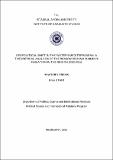DSpace Repository
GEOPOLITICAL SHIFT IN THE EASTERN MEDITERRANEAN: A THEORETICAL ANALYSIS OF THE REASONS BEHIND TURKEY’S ISOLATION IN THE REGION (2002-2021)
JavaScript is disabled for your browser. Some features of this site may not work without it.
| dc.contributor.author | KTARI, Imen
|
|
| dc.date.accessioned | 2023-09-12T11:36:10Z | |
| dc.date.available | 2023-09-12T11:36:10Z | |
| dc.date.issued | 2022 | |
| dc.identifier.uri | http://hdl.handle.net/11547/10280 | |
| dc.description.abstract | The purpose of the study is to highlight the core factors behind the geopolitical shift in the Eastern Mediterranean explained by the outcome of Turkey‟s exclusion. Recent studies have showcased absolute profits regional cooperative institutions would have engendered in the arena, consequently the formation of the East Med Gas Forum in 2020 is an attempt to conjointly secure the rewards estimated in the region. Soon, the result led to a sudden rival sequence in the region reflected in the alignment of major Eastern Mediterranean actors being Greece, Cyprus, Egypt, Israel, France and Italy to be cognitively entitled to the regional exploration and extraction of gas resources under the East Med Forum all against Turkey. Study aims at demystifying the nature of the geopolitical shift through the use of the Stephen Waltz‟s theory of the Balance of Threat and the Regional Security Complex Theory (RSC) developed by Burry Buzan, Jaap de Wilde and Ole Wæver. The dissertation findings defend the idea that Turkey projects a permanent threat to the above mentioned states starting from 2002, subsequent developments in its foreign policy compiled with its rising economic and military power, left a tremendous impact on the current ideological targets Turkey defends in the arena. Consequently, Turkey seems to be targeted by its neighbors and is now exempt from gas exploration and extraction entitlements other states currently enjoy, which contradicts its geopolitical interests. In terms of method, the study is qualitative using historical analysis and case study research, the historical analysis technique is significant to showcase the relevance of deep-rooted historical ties on the current sudden outcome of Turkey‟s isolation. Case study aims to testify the applicability of the Balance of Threat Theory and Regional Security Complex Theory on the exemption outcome using specifically the embedded case study to include various analysis of foreign policy relations with vi Turkey, being mainly in the present study, Greece, Israel and Egypt. Within this framework, data is collected from both the primary and secondary sources. Data from primary sources will be generated from the semi-structured interviews with political reporters and analytical experts in a face-to face setting, where all interviews are recorded and transcribed to seek new insights about the topic of relevance and reach clarity about the findings. Data from secondary sources is collected through the literature review, which requires document review from articles, press releases, books, and reports. Quantitative data is collected from secondary sources from books and articles, numeric characteristics are classified. In data analysis, the study uses both the content analysis technique to examine the qualitative data collected and discourse analysis technique to scrutinize the relevant data derived from the interviews. | tr_TR |
| dc.publisher | ISTANBUL AYDIN UNIVERSITY INSTITUTE OF SOCIAL SCIENCES | tr_TR |
| dc.title | GEOPOLITICAL SHIFT IN THE EASTERN MEDITERRANEAN: A THEORETICAL ANALYSIS OF THE REASONS BEHIND TURKEY’S ISOLATION IN THE REGION (2002-2021) | tr_TR |
| dc.type | Thesis | tr_TR |
Files in this item
This item appears in the following Collection(s)
-
Tezler -- Thesis [3470]
